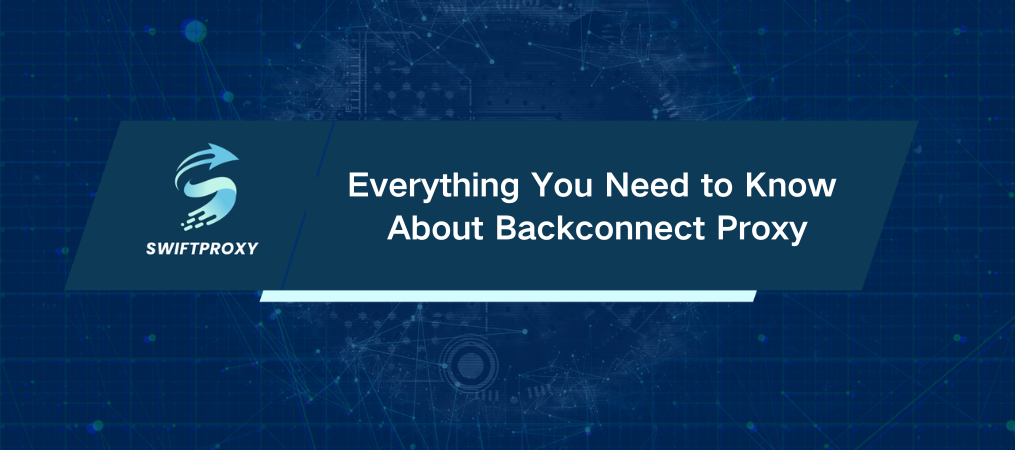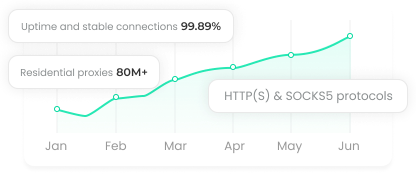Everything You Need to Know About Backconnect Proxy

Here's a fact to chew on: bots make up 47% of all internet traffic. Whether they're scraping data, automating tasks, or bypassing restrictions, they often rely on one powerful tool—proxies. And among the proxy options, backconnect proxies are the MVP.
But what exactly are they? How do they work? And more importantly, how can they supercharge your online activities? Let's dive into the ultimate guide to backconnect proxies—explained in plain English, no fluff, just actionable insights.
Introduction to Backconnect Proxy
A backconnect proxy is a proxy server that rotates your IP address with each request, acting as a middleman to shield your identity by constantly switching disguises. This makes it difficult for websites to detect or block your activities.
Backconnect proxies are especially valuable for tasks like web scraping at scale, bypassing geo-restrictions, protecting online privacy, automating social media actions, and running SEO campaigns. In essence, they function like the Swiss Army knife of the proxy world, offering a versatile and effective solution for a wide range of online needs.
How Do Backconnect Proxies Function
Here's the short version: backconnect proxies reroute your requests through a pool of IPs. Each request uses a different IP, keeping your activity anonymous and untraceable. Here's the process broken down step-by-step:
1. Request sent: You ask to access a website or resource via the proxy.
2. IP assigned: The proxy assigns a fresh IP from its pool to your request.
3. Request forwarded: The proxy forwards your request to the target website.
4. Response received: The website responds to the proxy server.
5. Response delivered: The proxy forwards the response to you while prepping a new IP for your next request.
Rinse and repeat. Your identity? Hidden. Your IP? Constantly changing.
Different Types of Backconnect Proxies
Wondering if all proxies can use backconnect setups? The answer is yes. But some are better suited for the task. Here are the main types:
· Residential proxies: These use IPs assigned to real devices, offering the highest level of authenticity. Great for scraping or bypassing geo-restrictions.
· Mobile proxies: Use mobile network IPs, ideal for tasks where mobile behavior is essential.
· Datacenter proxies: High-speed IPs from servers. They can rotate or stay static, depending on your needs.
· ISP proxies: A hybrid of datacenter speed and residential reliability.
Each type has its strengths, so choose based on your goals.
Common Uses of Backconnect Proxies
The use cases for backconnect proxies are practically endless, but here are five standout applications:
1. Data Scraping
Need to collect massive amounts of data without triggering bans? Backconnect proxies rotate IPs with every request, letting you scrape undetected.
2. SEO and Ad Verification
Track keyword rankings, monitor competitors, or verify ad placements across regions. Backconnect proxies ensure accuracy by simulating visits from multiple locations.
3. Social Media Automation
Running bots to like, follow, or post? Avoid detection and bans by masking your activity with rotating IPs.
4. Bypassing Geo-Restrictions
Access region-specific content or services. Whether it's streaming that unavailable show or gathering local market data, backconnect proxies have you covered.
5. Sneaker Drops and Limited Purchases
Competing for a limited-edition sneaker or concert tickets? Multiple IPs let you bypass purchase limits and secure that must-have item.
How to Select the Right Backconnect Proxy
Not all proxies are created equal. Here's how to pick the right one:
1. Stability: Look for a provider with minimal downtime and consistent performance.
2. Fast: A sluggish proxy network will frustrate you. Go for providers with blazing-fast options.
3. IP Pool Size: The larger the pool, the harder it is for websites to detect and block you.
4. Customer Support: Choose a provider with 24/7 support to handle any hiccups.
5. Cost: Balance your budget with the quality of service. A good proxy is an investment.
Pro Tip: Providers like ours offer proxies with a 70M+ IP pool, lightning-fast speeds, and a 7-day money-back guarantee (terms apply). Try before you commit.
Bottom Line
Backconnect proxies are more than a tech tool—they're your digital shield, unlocking access to restricted content, enhancing online privacy, and enabling large-scale tasks with ease. Whether you're scraping data, automating social media, or running SEO campaigns, these proxies ensure smooth sailing.
Note sur l'auteur

Here's a fact to chew on: bots make up 47% of all internet traffic. Whether they're scraping data, automating tasks, or bypassing restrictions, they often rely on one powerful tool—proxies. And among the proxy options, backconnect proxies are the MVP.
But what exactly are they? How do they work? And more importantly, how can they supercharge your online activities? Let's dive into the ultimate guide to backconnect proxies—explained in plain English, no fluff, just actionable insights.
Introduction to Backconnect Proxy
A backconnect proxy is a proxy server that rotates your IP address with each request, acting as a middleman to shield your identity by constantly switching disguises. This makes it difficult for websites to detect or block your activities.
Backconnect proxies are especially valuable for tasks like web scraping at scale, bypassing geo-restrictions, protecting online privacy, automating social media actions, and running SEO campaigns. In essence, they function like the Swiss Army knife of the proxy world, offering a versatile and effective solution for a wide range of online needs.
How Do Backconnect Proxies Function
Here's the short version: backconnect proxies reroute your requests through a pool of IPs. Each request uses a different IP, keeping your activity anonymous and untraceable. Here's the process broken down step-by-step:
1. Request sent: You ask to access a website or resource via the proxy.
2. IP assigned: The proxy assigns a fresh IP from its pool to your request.
3. Request forwarded: The proxy forwards your request to the target website.
4. Response received: The website responds to the proxy server.
5. Response delivered: The proxy forwards the response to you while prepping a new IP for your next request.
Rinse and repeat. Your identity? Hidden. Your IP? Constantly changing.
Different Types of Backconnect Proxies
Wondering if all proxies can use backconnect setups? The answer is yes. But some are better suited for the task. Here are the main types:
· Residential proxies: These use IPs assigned to real devices, offering the highest level of authenticity. Great for scraping or bypassing geo-restrictions.
· Mobile proxies: Use mobile network IPs, ideal for tasks where mobile behavior is essential.
· Datacenter proxies: High-speed IPs from servers. They can rotate or stay static, depending on your needs.
· ISP proxies: A hybrid of datacenter speed and residential reliability.
Each type has its strengths, so choose based on your goals.
Common Uses of Backconnect Proxies
The use cases for backconnect proxies are practically endless, but here are five standout applications:
1. Data Scraping
Need to collect massive amounts of data without triggering bans? Backconnect proxies rotate IPs with every request, letting you scrape undetected.
2. SEO and Ad Verification
Track keyword rankings, monitor competitors, or verify ad placements across regions. Backconnect proxies ensure accuracy by simulating visits from multiple locations.
3. Social Media Automation
Running bots to like, follow, or post? Avoid detection and bans by masking your activity with rotating IPs.
4. Bypassing Geo-Restrictions
Access region-specific content or services. Whether it's streaming that unavailable show or gathering local market data, backconnect proxies have you covered.
5. Sneaker Drops and Limited Purchases
Competing for a limited-edition sneaker or concert tickets? Multiple IPs let you bypass purchase limits and secure that must-have item.
How to Select the Right Backconnect Proxy
Not all proxies are created equal. Here's how to pick the right one:
1. Stability: Look for a provider with minimal downtime and consistent performance.
2. Fast: A sluggish proxy network will frustrate you. Go for providers with blazing-fast options.
3. IP Pool Size: The larger the pool, the harder it is for websites to detect and block you.
4. Customer Support: Choose a provider with 24/7 support to handle any hiccups.
5. Cost: Balance your budget with the quality of service. A good proxy is an investment.
Pro Tip: Providers like ours offer proxies with a 70M+ IP pool, lightning-fast speeds, and a 7-day money-back guarantee (terms apply). Try before you commit.
Bottom Line
Backconnect proxies are more than a tech tool—they're your digital shield, unlocking access to restricted content, enhancing online privacy, and enabling large-scale tasks with ease. Whether you're scraping data, automating social media, or running SEO campaigns, these proxies ensure smooth sailing.

















































